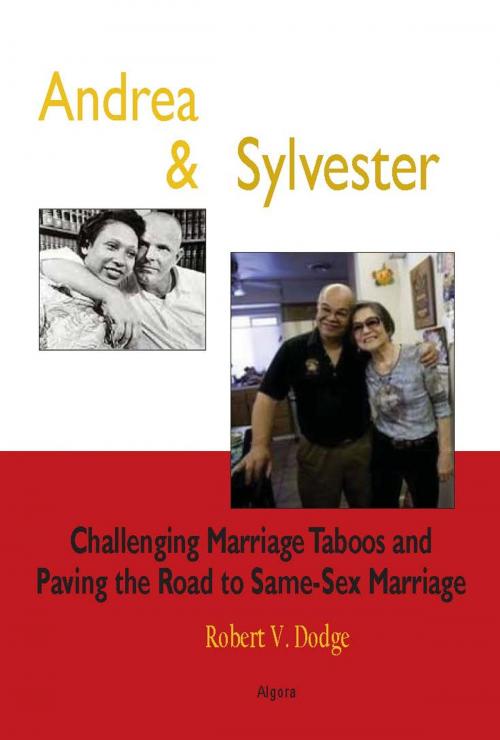Andrea and Sylvester
Challenging Marriage Taboos and the Road to a Same-Sex Marriage Decision
Nonfiction, Reference & Language, Law, Family Law| Author: | Robert V. Dodge | ISBN: | 9781628941616 |
| Publisher: | Algora Publishing | Publication: | January 5, 2015 |
| Imprint: | Algora Publishing | Language: | English |
| Author: | Robert V. Dodge |
| ISBN: | 9781628941616 |
| Publisher: | Algora Publishing |
| Publication: | January 5, 2015 |
| Imprint: | Algora Publishing |
| Language: | English |
In 1941 a young couple met and fell in love; but one of them was considered Black while the other was considered White. Laws against intermarriage between races had been upheld by every court in the United States since Reconstruction, after the Civil War. Andrea and Sylvester - a Mexican-American woman and an African-American man - challenged these laws and won, and their success inspired changes that ended that taboo. When same-sex marriage became a pressing issue, their case was the precedent that first persuaded the courts to allow it. Thus Andrea and Sylvester can be credited with successfully challenging a second marriage taboo. Dodge sets the scene for their personal drama and traces how their example helped establish the momentum toward more liberal marriage laws throughout the United States, culminating with the 2015 Supreme Court's decision to allow same-sex marriage.This is the story of a couple that has received too little attention for the impact they have had on society and law. Andrea, a Mexican girl, met Sylvester, a Black man, working on an assembly line during World War Two. Both were second-generation Los Angeles residents who suffered from discrimination in a city dominated by white superiority and the center of the eugenics movement. This book discusses their case and factors that led to the court decision. Their victory broke the logjam on racial intermarriage, and states began eliminating their prohibitions. After 19 years, the U.S. Supreme Court declared all laws prohibiting interracial marriage invalid.Andrea and Sylvester were soon dating and in love. When they went to get a marriage license, their application was rejected. A quirk in California law declared Mexicans "White" for certain purposes. They challenged the constitutionality of laws preventing marriages between races, though no case had been successful since the 1800s. This book discusses their case and factors that led to the court decision. Their victory broke the logjam on racial intermarriage, and states began eliminating their prohibitions. After 19 years the U.S. Supreme Court declared all laws prohibiting interracial marriage invalid.After the Stonewall riots and when AIDS raised legal questions for many partners, same-sex marriage became an issue for more couples. One response that states commonly gave was to pass laws defining marriage as a contract between a woman and a man; and the federal government adopted this position.Opponents of same-sex marriage frequently said this was a new phenomenon and it involved "unnatural" behavior, though same-sex couples have been known for over 4000 years, and the same had been said of those who advocated interracial marriage. Some blamed natural disasters and war deaths on homosexuals as God’s revenge. Massachusetts was first to declare the law preventing same-sex marriage unconstitutional and the precedent relied on most heavily was the case of Andrea and Sylvester, as their past was revived to challenge a second marriage taboo. California ruled next and again frequently called on Andrea and Sylvester’s case for support.That got things rolling and 37 states have approved same-sex marriage through legislative action or court decision. The US Supreme Court’s decision will determine whether the final 13 also are included.T
In 1941 a young couple met and fell in love; but one of them was considered Black while the other was considered White. Laws against intermarriage between races had been upheld by every court in the United States since Reconstruction, after the Civil War. Andrea and Sylvester - a Mexican-American woman and an African-American man - challenged these laws and won, and their success inspired changes that ended that taboo. When same-sex marriage became a pressing issue, their case was the precedent that first persuaded the courts to allow it. Thus Andrea and Sylvester can be credited with successfully challenging a second marriage taboo. Dodge sets the scene for their personal drama and traces how their example helped establish the momentum toward more liberal marriage laws throughout the United States, culminating with the 2015 Supreme Court's decision to allow same-sex marriage.This is the story of a couple that has received too little attention for the impact they have had on society and law. Andrea, a Mexican girl, met Sylvester, a Black man, working on an assembly line during World War Two. Both were second-generation Los Angeles residents who suffered from discrimination in a city dominated by white superiority and the center of the eugenics movement. This book discusses their case and factors that led to the court decision. Their victory broke the logjam on racial intermarriage, and states began eliminating their prohibitions. After 19 years, the U.S. Supreme Court declared all laws prohibiting interracial marriage invalid.Andrea and Sylvester were soon dating and in love. When they went to get a marriage license, their application was rejected. A quirk in California law declared Mexicans "White" for certain purposes. They challenged the constitutionality of laws preventing marriages between races, though no case had been successful since the 1800s. This book discusses their case and factors that led to the court decision. Their victory broke the logjam on racial intermarriage, and states began eliminating their prohibitions. After 19 years the U.S. Supreme Court declared all laws prohibiting interracial marriage invalid.After the Stonewall riots and when AIDS raised legal questions for many partners, same-sex marriage became an issue for more couples. One response that states commonly gave was to pass laws defining marriage as a contract between a woman and a man; and the federal government adopted this position.Opponents of same-sex marriage frequently said this was a new phenomenon and it involved "unnatural" behavior, though same-sex couples have been known for over 4000 years, and the same had been said of those who advocated interracial marriage. Some blamed natural disasters and war deaths on homosexuals as God’s revenge. Massachusetts was first to declare the law preventing same-sex marriage unconstitutional and the precedent relied on most heavily was the case of Andrea and Sylvester, as their past was revived to challenge a second marriage taboo. California ruled next and again frequently called on Andrea and Sylvester’s case for support.That got things rolling and 37 states have approved same-sex marriage through legislative action or court decision. The US Supreme Court’s decision will determine whether the final 13 also are included.T















